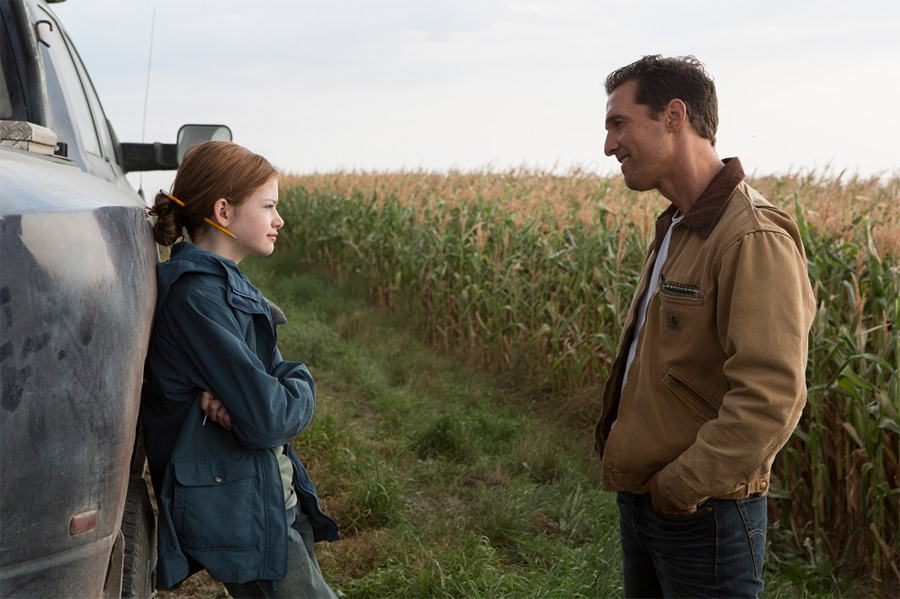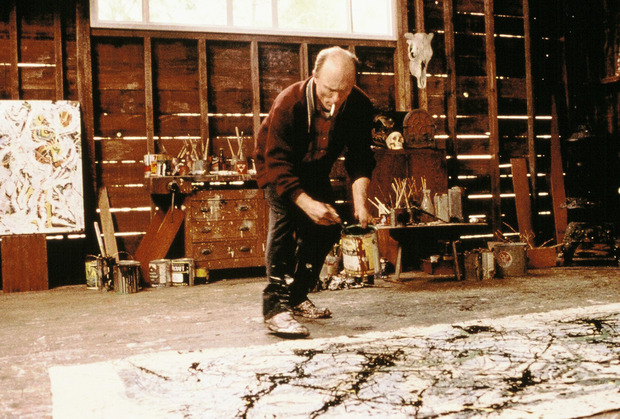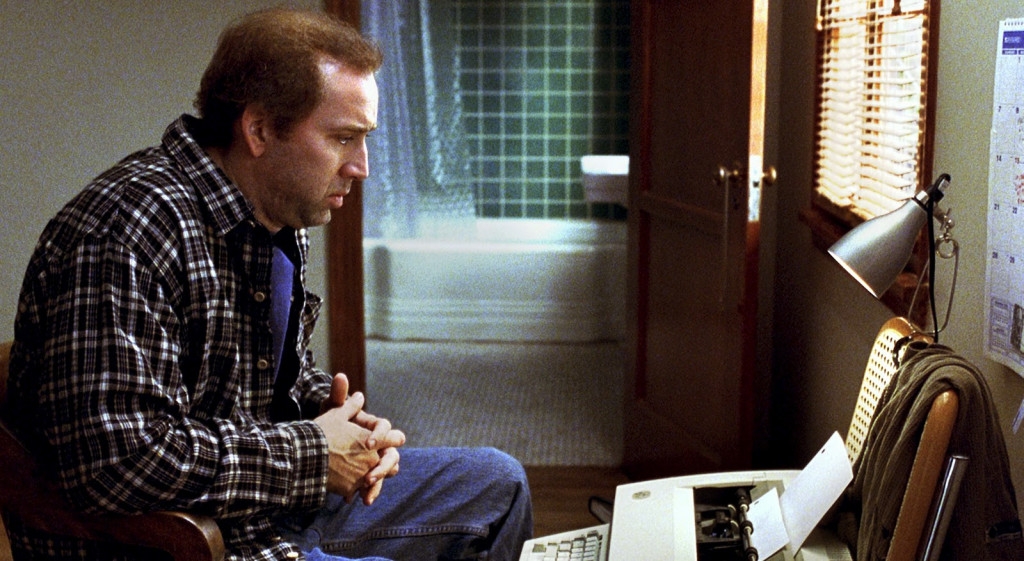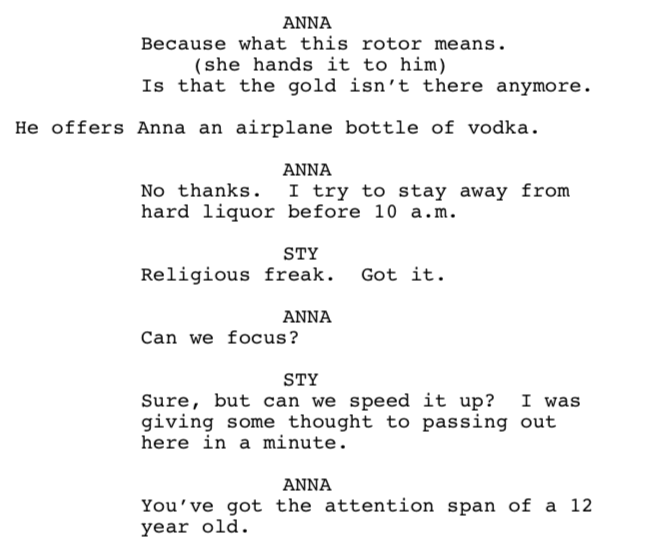Genre: Sci-fi
Premise: A small team of astronauts go out into the universe in search of potential new homes for the inhabitants of earth, who are experiencing a rapidly dying world.
About: Interstellar opened this weekend and did quite well at the box office, finishing in second place (with 50 million) to Big Hero 6 (hey, who’s going to beat an animated Disney movie at the box office?). The project was originally going to be directed by Steven Spielberg many years back (isn’t every movie at some point?). After he left, writer Jonathan Nolan kept working on the script, eventually convincing his brother to direct it.
Writers: Jonathan Nolan and Christopher Nolan
Details: 170 minutes
People seem to be all over the map on this one.
Some critics believe the film is laughable. Yet a lot of commenters (on various sites) have called it a masterpiece.
It seems like you have to either love or hate Interstellar. And as much as I want to fall on one side or the other to give the film/script that definitive stamp of good or bad, the reality is, this is a very mixed bag.
I do want to state the obvious though. Regardless of the quality of the film, Christopher Nolan is doing God’s work. The man is making big-budget original movies when he could be getting paid five times as much doing what everyone else in this town is doing – riding the superhero gravy train. Yeah yeah, he did Batman. But it was clear he didn’t want to make the third one. Which means between this and Inception, the last 7 years or so have been dedicated to infusing the box office with some of the only big-budget original entertainment out there.
Before we get into the juicy details, here’s a breakdown of the plot for those who haven’t seen the film. Coop is a former astronaut in a near-future world that’s running out of food. He somehow stumbles across a hidden NASA base, whose president informs him only hours after he arrives, that they need him to lead a mission to save the world.
They found a wormhole near Saturn that allows them to jump to another galaxy. There are three potentially habitable worlds in this galaxy. Coop is to head a small team that will check out these worlds, and hopefully verify that one is perfect for us to colonize. Coop has to leave his son and daughter for the mission, who we periodically check back in on, all the way into adulthood.
While the first act (which establishes the state of the world) is effective, it’s also really clunky. Early on we get a strange scene where Coop is driving with his daughter (Murph) and spots an “Indian drone” flying around. They chase it through the cornfields (how does a jeep going 30 miles an hour through a cornfield keep up with a drone that’s going 100 miles an hour?).
Apparently, according to Coop, the solar cells on this drone will “power the farm” for years. So they chase it and somehow hack into it with a computer and land it. The scene’s intent is a sweet one – a unique bonding moment between father and daughter – but because the drone causes so many frustrating questions, it impedes upon this intent. It’s an Indian drone? What is it doing in America? Also, if its solar panels can “power the farm for a year,” how come we never see these “solar panels” in action? In fact, I didn’t see any solar panels on the drone at all.
This is followed by one of the most confusing moments in the script. During a dust storm, Murph forgets to close her bedroom window. Dust then flies in and creates a pattern on the floor that Coop believes is a set of coordinates that he must travel to and check out (uh, sure). So he and Murph get in a car, drive all night, until they get to some private land that turns out to be, of all places, NASA, which has been hiding underground for years.
NASA is now run by Cooper’s old boss, Professor Brand, who informs Coop that they’re launching a mission in a week to look for new planets. And, oh yeah, since Cooper is the best astronaut in the world, he wants him to pilot the mission!
Whoa whoa whoa, what???
In old screenwriting circles, this is called: “lazy fucking writing.” So let me get this straight. Cooper finds a space institution he didn’t know still existed through dust coordinates in his daughter’s bedroom, and minutes after he arrives, he’s being asked to join their mission that leaves in a week??? Might that be the single biggest coincidence in the history of the world?
Like many of you, I wondered, if Coop is the best pilot in the world, why didn’t Brand go get him himself? This is “explained” in one of the many cheat lines in the screenplay, with Brand saying something to the effect of, “We didn’t even know you were still alive.” Oh give me a fucking break. You’re about to travel through a wormhole to another galaxy to explore three new planets and you didn’t think to check if the greatest astronaut in the history of the planet was still around?
Anyway.
This is followed by one of Nolan’s biggest weaknesses: clunky exposition. We’re given an extremely elaborate mission breakdown that includes plan As and plan Bs, jumping through wormholes, 12 total worlds, 3 promising worlds, past missions, black holes, singularities, time slippage, one way communication, and, of course, Interstellar’s favorite topic – gravity.
This is where things get really convoluted. Apparently, Professor Brand is working on some sort of gravity displacement technology that will allow him to raise NASA up into space, because the underground NASA structure is also doubling as (get this) a space station. He tells Coop that when he comes back, he’ll have solved this gravity problem, which, I think, means he’ll be able to use gravity to send the whole of earth’s population through the wormhole to one of these new worlds.
Uh, come again?
Anyway, once we get into space, the movie finally starts coming together. Gone are many of the convoluted plot points, and we’re finally able to just… breathe. Or, more appropriately, explore. Actually, that’s not 100% true. There are still some convoluted plot points and exposition, but now Nolan can use our ignorance of space, time, and the universe against us. I don’t know if a Black Hole outer-sphere really makes 1 hour the equivalent of 7 earth years, but it sure sounds cool so I go along with it.
But the exploration of the worlds really was cool. And the worlds allowed the film’s real star to emerge, TARS. If I’m going to take the writers to town for their laziness, I have to give them props for their creativity. TARS was the most original and lovable droid since R2-D2 and C3PO. He was unique and fun and unexpectedly versatile. When he goes to save Brand (Professor Brand’s daughter – played by Anne Hathaway) on that water planet as the tidal wave is approaching and he transforms into some windmill apparatus to speed through the water, it was one of those moments of pure movie magic.
This brings us to one of the most hotly debated segments in the movie (surprise casting spoiler), the Matt Damon sequence. From what I gather, the people who hated the rest of the movie loved this moment. And the people who loved the rest of the movie hated this moment. That’s probably because the Damon sequence was an entirely different genre from the rest of the film – it was a thriller.
I liked it, even if it did feel a bit out of place. The sadness behind that character is what sold it for me. Him being there for so long, all alone. It brings up questions that it sounds like we’ll be dealing with soon – as there’s this “mission to Mars” plan that will entail sending a single person to die on the planet. Along with the other crew member on the previous planet trip having to wait 23 years for Coop and Brand to return (every 1 hour on the water planet equaled 7 years in orbit), there were some really fascinating questions posed here about time and loneliness and its effect on people.
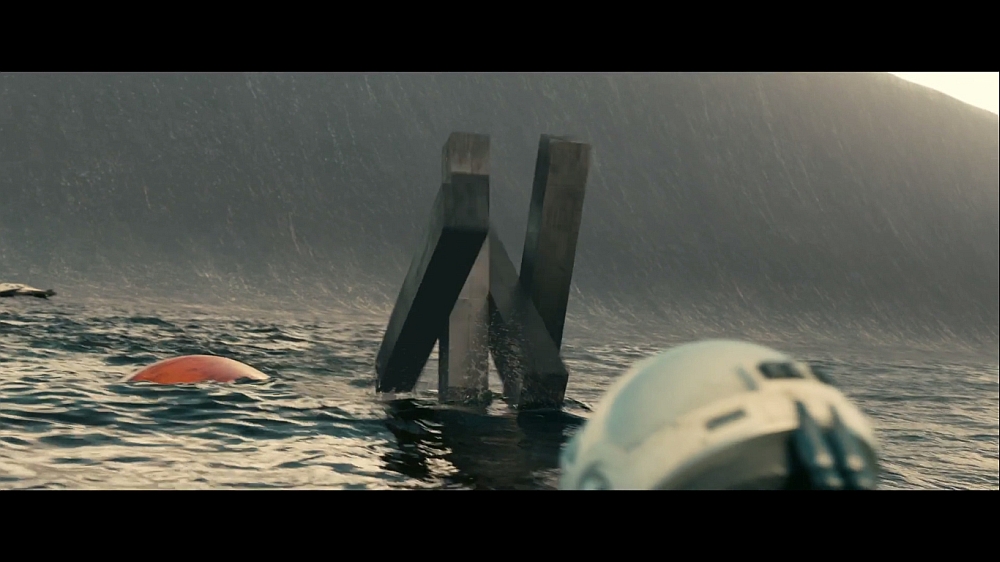 TARS needs his own movie! Preferably a team-up with John Wick’s dog.
TARS needs his own movie! Preferably a team-up with John Wick’s dog.
Up until this point in the film, I’d probably give Interstellar a double worth the watch. Despite is flaws, its pure grandiosity was magnetic. I think it’s sad that we aren’t pioneers anymore. I was more than happy for Christopher Nolan to show me what it would be like to explore again, even if it was a fictional experience.
And then…
And then Christopher and Jonathan Nolan start the bullshitting. Either that or they got lazy or they simply ran out of time. Because everything that happens in the last 30 minutes of this movie is pure hogwash. It feels like a couple of stoned college seniors forgot their term paper was due the next day, and scrambled to write the last 7 pages in a drug-induced stupor.
I mean come on. Cooper goes into the center of a black hole, encounters a “five-dimensional reality within a three-dimensional space,” which amounts to an infinite recreation of his daughter’s bedroom. In order to stop himself from going on this mission in the first place, he sends binary code through the second hand of an identical watch he gave his daughter…
I mean do I even need to go on? This is such “wrote myself into a corner now I’m going to bullshit my way out of it” I don’t even know what to say. With supernatural set-ups and payoffs, there’s something you need to establish that I call the “Immaculate Connection.” This is where you give the reader enough information so that the payoff’s arrival makes sense.
The Force is a good example. The Force is explained to us. We see it in action numerous times. This helps us understand how it works. Therefore, when Luke uses the Force at the end to destroy the Death Star, it makes sense to us.
This was the opposite of that. This was, “throw as much psychobabble bullshit at the wall as possible in the hopes that the viewer gets distracted enough that whatever vaguely connected payoff we throw at them will be sufficient.” I HATE IT when writers try to bullshit an audience. It’s your due diligence as a writer to give the viewer a satisfactory ending that makes sense within the construct of the imaginary world you’ve created.
I love that IGN (very politely I may add) called Jonathan out on his bullshit in an interview question. And Nolan’s answer verifies my suspicions. He made all this shit up on the fly. Here’s what IGN asked: “So when they find Cooper they are by Saturn again and they have these very advanced ships. So I guess I wondered: Did it take them many years to build the ships? If so, where did they get the resources? Was it on a new planet or on a dying Earth? Also, how did they survive on Earth long enough to build such ships? Or had they gone and colonized in the far reaches of space? In another galaxy? Had they found Brand and very quickly and impressively rebuilt their culture? And if they had gone and colonized, why were they at Saturn again? Right at that exact moment? What are they hoping to find there? If they had found Brand, then she would now be old too, wouldn’t she? Yet, Murph is suggesting that her father go find Brand so that they can build a colony together – which indicates that Cooper and Brand would still be the same age and compatriots. And that they would remain so once he found her in that small ship. Can you explain what’s going on in that scene? And just the science behind it?” Just the fact that someone has to ask a question this complicated shows how messy and thrown together this ending was. Nolan’s response starts with: “I’m happy to try — although I feel like it’s for the viewer to enjoy and trust that we spent and awful lot of time thinking about these things, as we did.” Of course. The old, “It’s up to the viewer.” That works when you’ve created a carefully thought out story. It’s a cop-out when you’ve belittled the audience by giving them a combination of psychobabble and nonsense for the past 30 minutes (you can read the rest of the interview here).
Am I being too harsh on Interstellar? Probably. But I believe Christopher Nolan should be held to a higher standard. He’s shooting for the stars here. So you need to be judged on what your goal was. The goal was a smart epic look at space travel. That’s not what we got. We got an imperfect movie with moments of brilliance, marred by moments of colossal laziness.
MOVIE RATING:
[ ] what the hell did I just watch?
[ ] wasn’t for me
[x] worth the price of admission
[ ] impressive
[ ] genius
SCREENPLAY RATING:
[ ] what the hell did I just read?
[x] wasn’t for me
[ ] worth the read
[ ] impressive
[ ] genius
What I learned: “Cheat lines.” These are lines writers use to cover story problems in their script. Why didn’t they go looking for the greatest astronaut on the planet to head their mission in Interstellar? “We didn’t even know you were still alive.” Why in the world would they not think Coop was alive? Was there any evidence to this theory? What’s the harm in doing your homework and at least trying (it turns out he was only a few hours away!)? A well laid-out plot does not need the writer to constantly cover for it. Your use of a cheat line is indicative of bigger problems in your story. Instead of trying to bullshit the audience with a cheap cover line, go back and fix the underlying problem that’s causing you to cheat in the first place (in other words, it would’ve made much more sense for Professor Brand to show up on Coop’s doorstep and ask him to join his mission).
Read as far as you can in each, then VOTE for which one you think should get reviewed on the site. Feel free to offer constructive criticism to the writers. Also, please be CLEAR with your vote (preferably, state at the beginning of your comment: “My vote is for…”). To get the amateur scripts early, make sure to sign up for my newsletter. :)
TITLE: Partners In Crime
GENRE: Action, Comedy, Crime
LOGLINE: Busted for smuggling drugs to bankroll their flight home, two spring breakers escape jail time by becoming a snitch for a DEA agent to take down a Mexican drug lord.
WHY YOU SHOULD READ: I wanted to write a fun, commercial movie and I believe that I succeeded. I would compare this farcical comedy to such past hits as 21 Jump Street and Pineapple Express. I hope you enjoy!
TITLE: Escaping Freedom
GENRE: Drama
LOGLINE: A Gestapo agent is mistaken for a Jew and sent to Auschwitz to fight for his life.
WHY YOU SHOULD READ: I’m the only one that finds myself amusing. I like no walks on the beach. I’m an ex-gangleader for a Chicago black gang, even though I’m white – and that’s not a joke – this has equipped me to write about some strange characters in life and writing probably saved my life. And I’ll retire before I start a career in screenwriting if you don’t read this script. That was a joke. Had to try. — Why should this script get read? If nothing more than the Auschwitz victims are dying yearly and they have less a film of remembrance than ever before. They had five minutes in “Schindler’s List,” why not give them a full movie to warn future generations of what man’s capable of doing? It’s a script the size of War & Peace, but a little shorter than an Aaron Sorkin film. While the characters are fictional, the crimes and timeline of events are historically accurate…
TITLE: ACCELERATOR
GENRE: Sci-Fi Thriller
LOGLINE: An agent with a CIA-like agency of the future struggles with his tragic past while on a mission to prevent the emergence of a perilous new technology.
WHY YOU SHOULD READ: THE MATRIX meets THE AVENGERS meets SIN CITY is how I would pitch ACCELERATOR. I think a lot of what ultimately motivates writers is that we find ourselves getting bored with our favorite genres and decide we can do a better job. That was certainly the case with this script. ACCELERATOR’s the kind of sci-fi thriller that would get me to the multiplex.
TITLE: Rocket Surgery
GENRE: Coming of age
LOGLINE: A lovesick twelve-year-old boy must use his dad’s inventions to stop a monster he accidentally unleashed on his town while deciding between the girl of his dreams and the girl who loves him.
WHY YOU SHOULD READ: Reading Carson’s pleas for someone to write an original script loaded with GSU, unique characters, a solid plot and at least one wacky character, I set out to tackle this challenge. If I had to describe this script, which I am, I’d say it is a little like Gremlins with the tone of Back to the Future. I wanted it to be a fun ride for those of us who love getting lost in movies.
TITLE: OTIS KRINGLE HATES CHRISTMAS!
GENRE: Biopic
LOGLINE: After the entire Kringle clan is murdered, Santa’s illegitimate son is forced to save his least favorite holiday from a menagerie of supernatural fuckwits.
WHY YOU SHOULD READ: My name’s Otis J. Kringle and I’m not a screenwriter — I’m fucking Santa Claus. Hang on, that came out wrong, as I am not actually “fucking” Santa — that would be weird and (as you’ll see) necrophilia. More like, I AM Santa Claus. I didn’t used to be, mind you. Truth be told, I’ve always considered Christmas to rank somewhere between getting a colonoscopy from Edward Scissorhands and watching FAILURE TO LAUNCH on a neverending loop. But alas, events unfolded that led me to pick up the jolly red mantle, events like stealing a UPS truck, getting thrown in jail, stepping in reindeer shit, throwing down in fisticuffs with Frigid Bitch and Jack Frost, riding flying lions, massive mall sing-a-longs, things of this nature. I know, right? I was pretty amazed, too. So amazed, I felt the need to share and find an outlet for my story (and movie, because who doesn’t love a new Christmas flick?), namely ScriptShadow. What can I say — I read your site, love the shit out of your site, and as far as I’m concerned, this makes it to a Friday review, everybody who reads your site will be put on the Nice List this year. Even Grendl. I know when you’re sleeping and when you’re awake, — Otis J. Kringle
Get Your Script Reviewed On Scriptshadow!: To submit your script for an Amateur Review, send in a PDF of your script, along with the title, genre, logline, and finally, something interesting about yourself and/or your script that you’d like us to post along with the script if reviewed. Use my submission address please: Carsonreeves3@gmail.com. Remember that your script will be posted. If you’re nervous about the effects of a bad review, feel free to use an alias name and/or title. It’s a good idea to resubmit every couple of weeks so your submission stays near the top.
Genre (from writer): Horror/Survival
Premise (from writer): Deep winter in Civil War Era Missouri – A Union Deserter, a Priest and an Assassin must fight for survival when they are stranded in the wilderness and hunted by a terrible Sasquatch.
Why You Should Read (from writer): Liar. Coward. Judge is a script that has been written out of frustration as much as ambition. As a conscious reply to those horror scripts that turn a blind eye to character, theme and subtext it is a pitch black descent into madness that treats the Sasquatch myth with rare seriousness. It is a savage horror with a truly unique setting that is driven not by the relentless movement from jump scare to gore gross-out but by the development of characters. — Most of all though you should read Liar. Coward. Judge because it doesn’t just ask that cliché question; “who will survive?” but wants you to ask yourself; “does anyone deserve to?”
Writers: Mark and Christopher Webster
Details: 109 pages
Okay, I’m going to bust out a sports analogy today because it’s been awhile since I’ve done so. I am a sad supporter of the abysmal excuse for a football franchise known as the Chicago Bears. My poor stumbling team is 3-5 in the standings, a far cry from what many predicted would be a successful season.
A lot of people have come up with reasons why the Bears are so terrible, but one in particular has stuck with me. “They have no identity,” an analyst pointed out. “Look at the New England Patriots,” he continued. “They’re going to sling the ball around on offense and put up a lot of points. Or the Baltimore Ravens. They’re going to play physical smash-mouth defense and win tight low-scoring games. Even the old Bears had an identity. They were going to run the ball to draw out the clock, keep the score close, then win the turnover battle.”
This Bears team has no identity. Nobody’s really sure what they’re trying to do.
I think this need for an identity can be transferred over to movies as well. As readers (or audience members) we demand that a film have some kind of identity. We want to know what we’re getting into. This is usually measured by genre. Horror, thriller, crime-drama, action-adventure. But it can also encompass a certain type of story. The “home invasion” movie, for example.
While I was reading “Liar Coward Judge,” I started to realize that I didn’t know what the movie was. I didn’t know its identity. It wasn’t exactly a horror film. It wasn’t exactly a thriller. I’ve seen movies where a town is threatened by a beast. This wasn’t that. I’ve seen movies where a group of people are trapped inside a space, hunted by a monster. This wasn’t that.
The more I read of “Liar Coward Judge,” the less clear I was on what kind of movie I was reading.
The premise for “Liar Coward Judge” starts out like a bad joke. “A priest, an assassin, and a rapist walk into the woods.” Of course, it’s a little more complicated than that. The year is 1870, after the Civil War has ended, and an assassin has been hired by a Confederate Commander to kill a man named Matthew Jefferson, a rapist and a killer.
Meanwhile, we meet a Union war deserter, who happens upon a church. Back then, even if you were doing bad things, the rules were that churches were sanctuaries. Once inside, nobody could hurt you. So the deserter finds a church, where he meets our priest, and also this Matthew Jefferson fellow.
The next morning, Jefferson is gone, but a new man arrives. Our assassin! Once he realizes our duo knows Jefferson, he forces them to head into the woods and find him. They don’t go far before finding Jefferson, who’s hanged himself.
It would seem that the mission is over, except that they run into some huge monster-type-thing that’s killing everyone in the forest. They become an impromptu team, running from this evil beast, all the while trying to find their way out of the forest and to safety.
 Does a movie like Interstellar have an identity? Should it have one?
Does a movie like Interstellar have an identity? Should it have one?
So let’s get back to that question. Does a script need an identity? An argument can be made that if you want to write something unique, you want to AVOID an identity, right? I mean what is the identity of Christopher Nolan’s “Interstellar?” Or Charlie Kaufman’s, “Being John Malkovich?”
It’s a fair argument but, as always, the further you walk off the beaten path, the more likely it is you’ll get lost. And somewhere along the way, “Liar Coward Judge” got lost.
It’s interesting that Mark and Christopher bring up character as their focus here, because I think, after the identity problem, that’s where the bulk of the problems lie. There’s this belief that if you’re handling your characters in a serious manner, you’re somehow creating a compelling character piece. And you do feel an intensity behind each of our character’s motives in “Liar Coward Judge.”
But strangely enough, I didn’t sense depth to any of the characters. They were all surface-level people. A priest who’s a dedicated priest. An assassin who’s a mean assassin. A deserter who’s a coward.
The best characters tend to be dynamic. Bad people who have good qualities and good people who have bad qualities. That unexpectedness adds a rich extra layer to the character that makes them far more interesting to watch. Think of one of the most popular characters in the history of cinema – Batman. He’s a good person, but he’s not above doing bad things to push his agenda. We don’t see any of that subtlety here. With some minor exceptions, everyone here can be taken at face value all the time.
The Walking Dead and Lost are two shows that were masterful at this. You’d think a character was bad (Locke), only to find out you were wrong, only to LATER find out you may have been right. As I watch more TV, I’m starting to see that the best shows do exactly this. They make you wonder who a character is for awhile. You have to work to find out their true colors. Here, the true colors are established right away and never change.
The Deserter had the most potential to be a cool character. He was the one we knew the least about. And there was an indication that he had some secrets. But alas, none of these secrets ever came to light. He was as straightforward a coward as they get.
I have a feeling the Websters locked into these archetypes with the very intention of exploring them at face value. A coward as a coward. Which is why we don’t get any surprises here. While that sounds good in theory, sometimes you have to abort your original intentions if they’re not working. Because they were so obvious, these characters stopped being interesting (to me) around page 20. To keep them exciting, we needed them to evolve over the next 90 pages. But they never did.
Also, when your movie focuses on a small group, it’s important that each character be different from the others. The way they talk, the way they act, the choices they make, must all be unique to them, so you get the most conflict out of the interactions in the group. Strangely, everyone here was pretty similar, especially the priest and the deserter, who both just wanted to get the hell out of here. The assassin was a little different, but honestly, not much.
The thing I kept wondering was, why don’t we put this square in the middle of the Civil War (instead of afterwards) and place one hardcore Confederate and one hardcore Union in the group. These foes, who hate everything the other stands for, must now team up (with the priest or an altogether new character) to defeat this Sasquatch.
Finally, there’s the “likability” factor. The Websters point out in their “WYSR” that you’ll wonder, while reading this, if any of these characters deserve to survive. As is implied by that statement, nobody here was likable. A character doesn’t HAVE to be likable for the audience to care about them, but it’s a lot harder to keep the audience on your side with unlikable characters than with likable ones. Indeed, I didn’t care if any of these three lived or died, due to all of them exhibiting annoying or unlikable qualities.
Look, I love Sasquatches. I remember being fascinated by Sasquatches as a kid. So I think there’s a movie to be made where a Sasquatch is featured. But the exploration of the Sasquatch here is secondary to the exploration of the characters. Normally, that would be good, IF the characters warranted the scrutiny. These characters aren’t interesting enough, likable enough, or unique enough to handle the spotlight of the story. I would intensify the involvement of the Sasquatch in the movie, then go back to the drawing board with the characters. Make them deeper, more dynamic, with more secrets, and make them truly different from one another so there’s more conflict. Good luck. ☺
Screenplay link: Liar Coward Judge
[ ] what the hell did I just read?
[x] wasn’t for me
[ ] worth the read
[ ] impressive
[ ] genius
What I learned 1: Face value is a bad thing. Just like in real life, you shouldn’t be able to take your characters at face value. There should be layers there. There should be more going on underneath the surface. Obviously, there will be exceptions to this, but for the most part, a character who can be taken at face value is a boring character.
What I learned 2: Your main characters must evolve over the course of the story. You can do this in a number of ways. You can reveal secrets about their past that change our perception of them (someone we thought was good ends up being a rapist). You can present them one way (a coward) only to later have them act the opposite (be brave). A character can learn something over the course of the story that grows their confidence (Neo in The Matrix). A great movie to see all this in action with is Pitch Black. Watch how each character grows into something different from what you originally perceived. I saw the characters in “Liar Coward Judge” staying pretty much the same from opening to closing credits. That led to me being bored with them pretty quickly.
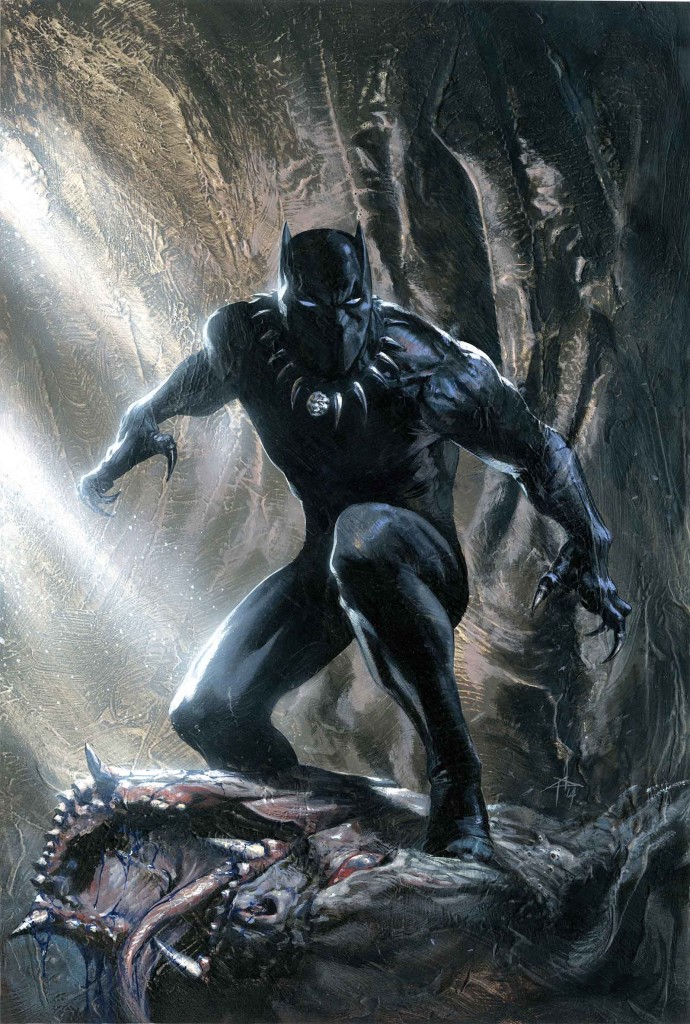 A Marvel superhero? Or a writer’s demons?
A Marvel superhero? Or a writer’s demons?
Screenwriting is in a funny place right now. The days of the huge spec sale are more a part of the past than the present. When you meet with managers and agents these days, they’re more likely to ask you about your latest TV pilot than your latest feature spec. As Marvel grows its brand, filling more and more of those precious movie slots with its bottomless pit of superhero characters, there’s more uncertainty than ever about what the industry wants. I mean it used to just be, “Write something marketable that you’re passionate about.” But that’s not enough anymore. You need a strategy.
With that said, most writers still make it into the industry the old fashioned way – hard work. They write something that speaks to them. It ends up being good enough for people to pass around. The writer gains fans, writes something else, gains more fans, builds his network, and sooner or later, writing assignments start coming his way. They’re small at first, but they get bigger as the writing improves. Some of these writers take the feature assignment career route. Some join TV staffs. Eventually, they become consistent working writers in the industry.
Now what they do from there – whether they stay at that low-to-middle working professional status or break into the elite level – is dependent on a number of factors. And that’s what I’d like to talk about today. I want to discuss “writer stages.” I read so many screenplays and most of the time after I finish, I think, “If this writer doesn’t change, they’re going to be stuck in this stage for the rest of their lives.” Part of being a good writer is recognizing where you’re at and working to fix your weaknesses. If you’re not willing to do this, stop writing now. You need to be a student of this craft, as well as your involvement in it, if you want to succeed.
STAGE 1 – THE ARROGANCE STAGE
WRITER NICKNAME – “THE CONTEST SUPPORTER”
The Arrogance Stage represents one of the most common misconceptions about screenwriting – that it’s easy. People see movies like “Need for Speed” and know, for a fact, that they can write something better. So they write a script, maybe two, and start hawking them around town, waiting for everyone to hail them as industry saviors. These scripts are the worst scripts I read, by far, as there’s a lethal combination of suckitude going on. One, the writer is using the industry’s worst movies as their bar. Therefore, everything is written to be only slightly better than that terrible movie they saw. The irony is that even though these writers THINK they’re better than the writers who wrote Need for Speed, they’re actually a lot worse. So they’re giving us an even suckier version of an already sucky movie.
And second, the writers have never studied storytelling on any level. It’s such an arrogant oversight that it actually infuriates the reader. It would be like wanting to be a surgeon but never studying the inside of the body. These scripts always lack original concepts, build, suspense, rhythm, character development, structure, or anything resembling what makes a story work. To add to the fun, there is so little respect for the craft, that the scripts are often riddled with misspellings, misused words, grammatically incorrect sentences, and more. I call these writers “Contest Supporters” because their scripts typically comprise of 75% of all contest entries and therefore fund the contest for the real writers.
To Break Out: To break out of The Arrogance Stage, you need to come to terms with reality. Your first scripts probably aren’t any good. They might be. But you need to operate under the assumption that they’re not. One of the biggest steps a beginner writer can take is admitting that being a professional screenwriter is hard. Once they do this, there will be a tectonic shift in the way they approach the craft. They will now put some real time and effort into the practice, and this should thrust them into Stage 2 in no time.
STAGE 2 – THE FOG-OF-WAR STAGE
WRITER NICKNAME – “THE JACKSON POLLACK”
I call this the “Fog of War” stage because you rarely know where you are as a screenwriter while in this stage. How effective can you be if you’re not sure whether you’re 20 feet from the enemy or 20 miles? The commonality I see with these scripts is tiny bursts of good writing, followed by long chasms of bad writing. Why does this happen? Well, you’ve only just started learning the principles of screenwriting. So you know a few things, like what “3 act structure” and “character arc” mean, but since you’ve only written 2-3 screenplays, you’ve only been able to practice these principles 2-3 times. When have you ever perfected anything on the 3rd try? Likewise, you haven’t learned how to deftly hide exposition yet, how to come into scenes late, how to use subtext (etc., etc., etc.). Some of these things will come more naturally than others, but rarely can a writer nail them all immediately. I call these writers “Jackson Pollocks” because it feels like they’re randomly throwing paint against the canvas, hoping that the sheer earnestness of their intent will result in a masterpiece.
To Break Out: You need to embrace the study-bug in this stage. Read as many screenwriting books as you can afford. Read as many screenplays as you can find time to read (produced, unproduced, and amateur!). As soon as you learn something, go practice it. Study, read, write. Study, read, write. This stage takes time, because learning all the elements of good storytelling doesn’t happen overnight. But if you’re serious about screenwriting, this tends to be the stage that gives you your screenwriting armor.
STAGE 3 – THE STAGE OF DEATH
WRITER NICKNAME: “THE CYBORG”
I call this The Stage of Death because this is where many screenwriters, writers who have given years to the craft, disappear silently into the night, never to be heard from again. They’ll feel like they gave it their all, but couldn’t get over the hump for some reason, and so they leave. I have some strong opinions about these writers. Real writers never give up. They NEED to write. First and foremost, writing has to be FOR YOU. It has to be an outlet that you can’t stop yourself from doing, like a drug. Sure, as you get older and the complexities of life get in the way (i.e. supporting a family), you’ll have less time to write. But if you love this craft, you should never stop writing.
While Stage 1 scripts make me the angriest to read, and Stage 2 scripts are the most boring to read, Stage 3 scripts tend to be the most frustrating to read. That’s because by this stage in the game, the writer generally knows what they’re doing. They know how to tell a story. The problem is, they haven’t figured out how to tell a good story. A big part of the problem is that these scripts are driven too fiercely by structure and technicalities. Writers have learned what the books tell them to do, but they’re overplaying these elements, creating a robotic experience for the reader (hence: “The Cyborg”). These are the scripts that make the quarterfinals, maybe even the semifinals, of contests, and they show a respect for and an understanding of the craft. But they just don’t resonate. It’s almost like the scripts lack soul.
To Break Out: To break out of this stage, two things need to happen. First, there needs to be a change in philosophy. You know the technicalities of screenwriting. Now you have to go back to the mindset of a beginner. Instead of trying to meet technical checkpoints, start writing on “feel” again. Let your emotions guide you. Take a few chances. Break a few rules. The problem with writing a technically proficient script is that it reads like a technically proficient script. It’ll get you high grades with your professors, but low grades from readers who actually want to be moved. To get to the next level, you have to start emotionally connecting with the reader, and writing on emotion will help that. Now don’t get me wrong. You still want to follow the general guidelines of good storytelling. You just no longer want those guidelines to dominate your script.
The second thing that needs to happen is you need to identify your biggest weaknesses and work on them. If you suck at dialogue, you need to dedicate huge chunks of time to improving your dialogue. Finding your weaknesses requires getting HONEST feedback from others, not the “rah-rah” feedback that makes you feel good but keeps you chugging along at the same level. Locate where you suck and work to improve yourself.
STAGE 4 – THE TINY STAR STAGE
WRITER NICKNAME: “THE FRUSTRATED PROFESSIONAL.”
Getting to this stage is a big deal. You feel like you’ve crossed a major hurdle. You either have a manager or an agent (or both), secured a legitimate option or two (from a big production company) and/or have gotten assignment work. But for whatever reason, you still feel like an outsider, like a Stage 3. Your scripts aren’t landing on that prestigious Black List. Nor are they being fielded by the upper echelon of Hollywood – the people who can actually make things happen. What’s wrong?
Well, I can tell you what I see in the scripts themselves. These offerings are better than Stage 3 scripts. But upon reading them, I always feel like I’ve read them before. While the characters are well-written and the story is solid, I generally know what’s going to happen next, and therefore the story feels like it’s going through the motions. In some ways, these scripts are just as frustrating as the Stage 3s because you can see the potential for the story to break out, but it never does.
To Break Out: Three things need to happen to break out of this stage. First, take more chances. If you want to write something great, you need to take chances, because those chances are going to lead to the differences that make your script stand out against your competition. Taking chances is terrifying. But since the best stories are unpredictable, you need to make some unpredictable choices to write something great.
Second, you need to focus more on character. When I read the top scripts out there, it’s the characters that take hold of me, who make me feel something, who give me the warm and fuzzies. Rarely does a plot point touch me on an emotional level. So learn how to build interesting characters, how to build likable characters, how to build compelling relationships, how to arc characters, how to create problems between characters that need to be resolved. Learn how to make relatable characters and situations so that readers feel a connection to the people you’re writing. In short, focus more on character.
Finally, challenge yourself more. Most writers believe they only have a fifth gear. You actually have a sixth gear. And this is the gear that turns good scripts into great ones. Let me give you an example. Ben Ripley, the writer of Source Code, wrote a series of drafts of Source Code where an investigator comes in and investigates a time-altered train crash. He created the “5th Gear” version of this story. And he could’ve stopped there and sent the script out. But he decided to challenge himself, to push and find the element of the story that turned an average script into a great one. This led him to realize a more interesting take was to shift his main character from an impartial investigator to one of the passengers on the train. The next thing he knew, his script became one of the hottest in Hollywood.
STAGE 5: THE SUPERNOVA STAGE
WRITER NICKNAME: “THE TRUE PROFESSIONAL”
A Stage 5 script is a script that moves me. And you move people by creating compelling realistic characters going through universal problems that the average person relates to. Combined with a story that tackles strong universal themes (forgiveness, family, love, etc.) you can really move a reader. When you add an original concept and an unpredictable plot, you can count yourself among the best writers in the world. Of course, even Stage 5 writers are unsatisfied. I suppose the only thing that makes you happy at this stage is an Oscar. But you know what, if that’s your biggest problem in screenwriting? Is that you haven’t won an Oscar yet? I think you’re doing okay.
Now obviously, no two screenwriters’ journeys are alike. I’m not saying that every writer should be pigeonholed into one of these five stages. I’m saying that based on the scripts that I’ve read, this is where most screenwriters lie. But if that’s too complicated for you, here’s a simplified version of the plan: Treat yourself as a student of the craft. Always be studying. Always be reading. Always be writing. The second you think you’ve got it figured out in this business is the second you’re done. You should always be trying to get better!
Genre: Comedy
Premise: A modern-day narcissistic adventurer happens upon a clue that might lead him to the fabled lost City of Atlantis.
About: Comedy writing team Mike Arnold and Chris Poole are no strangers to outrageous manly comedies, as they popped onto the scene with the highly ranked Black List script, The Grackle, back in 2006, about a New Orleans barroom brawler who starts his own business settling disputes for people who can’t afford a lawyer. They then sold something very manly-sounding called “Captain Awesome” to Fox. And finally, Beaujolais, back in 2008. As a testament to how difficult the business is, the writers still don’t have a produced credit six years later. It just goes to show that selling a spec is not the end-all be-all. It’s just the beginning of a much tougher journey where you’re now competing with bigger hungrier fish.
Writers: Mike Arnold and Chris Poole
Details: 123 pages (3/19/08) draft
 I couldn’t think of ANY actor for this role, which might be why they haven’t made it. Joel McHale is all I’ve got.
I couldn’t think of ANY actor for this role, which might be why they haven’t made it. Joel McHale is all I’ve got.
When you hear the pitch, “The redneck version of Indiana Jones,” you sit up and pay attention. I love strange mash-ups, and truth be told you could mix anything up with Indiana Jones and I’d read it. The haunted house version of Indiana Jones. The pirate version of Indiana Jones. The Food Network version of Indiana Jones. I’m there! But something about the “redneck” slant took it to a new level. It just sounded funny.
The script follows our boisterous hero, Sty Beaujolais, a “borderline insane completely fearless” half-retard who reminds you of a cross between a young Chunk Norris and The Dos Equis guy, with a little Agent 86 thrown in for good measure. Sty is the kind of guy who hums his own theme music and wears a “mandana” signed by the great Bruce Willis.
Somehow, Beaujolais stumbles on a rare part from one of those old Enigma machines that the Nazis used to use during World War 2. And when he pairs up with the niece of his dead mentor, she becomes convinced that the part is one of three that, when used in connection with the Enigma machine, will give them the location of the lost city of Atlantis.
The problem is, his new female partner kinda hates him. As in, thinks he’s the worst human being in the world. Which is news to Beaujolais, who always operates under the assumption that all women love him.
Anyway, Beaujolais and his “romantic interest” (as he calls her) must bounce from country to country looking for these three missing Enigma parts, occasionally running into his evil nemesis, the snobby Brit, Victor Denardo, along the way. Denardo has perfected the villainous trait of waiting for the good guy to find the treasure so he can then steal it from under him.
Somewhere along the way it becomes unclear to us if they’re going after the lost City of Atlantis or just Nazi gold that was hidden after the war. But either way, Beaujolais is going all-in, like he always does, with plans to come away with the treasure, the girl, and a terribly pitched version of the closing credits song.
After finishing Beaujolais, I sat there stumped. What I’d read certainly had energy. It boasted a fun larger-than-life main character I could see an A-list comedian having fun with. The dialogue was amusing at times (ANNA: “Good. Then we’re in this together.” Sty takes this in – leaning back in his seat. STY: “Are you asking to join Sty Beaujolais on a professional adventure? In the role of the clever sidekick perhaps? Is that what you’re saying?” ANNA: “I have no idea what any of that means.” STY: “Maybe the love interest?” ANNA: “Absolutely not.”) There was even a clear goal driving the plot (find the lost city of Atlantis).
And yet I found myself bored. But I couldn’t tell if it was because the script wasn’t funny or if I didn’t find this character funny. The overly self-aware manly-main character, who’s graced the leading role in about ten specs I’ve read over the years, seems played out to me, like an extended version of the Dos Equis commercial guy.
My feeling is that there’s a reason the Dos Equis guy is in a commercial and not in a feature. People love that kind of thing for a few seconds. But can they handle it for it two hours?? It’s the McGruber Effect. McGruber is funny as a 3 minute SNL sketch, but his character isn’t built with enough weight to extend those 3 minutes to 100.
That’s the thing with comedies. When you think of them in a general sense, you imagine all the hilarity ensuing. It isn’t until you start writing, though, that you realize not every scene can be a 5 star knee-slapper. You’re going to need some scenes to set up your story, to set up your characters, to set up later situations. And, in those scenes, you’re going to need depth to draw upon. You’re going to need your character to actually give a shit.
Take a movie like There’s Something About Mary, which is VERY broad in its own right. The reason that movie works is because you love Ted (Ben Stiller). And you love Ted because of those early scenes where he’s being real. Where he’s genuinely falling in love with Mary.
Contrast that with Beaujolais, where Beaujolais is making a joke every five seconds about how he wants to bang Anna (the love interest). You know he doesn’t really like Anna. Every comment about her is a joke. So you’re never REALLY emotionally involved in whether Beaujolais is going to win her over or not. And to keep an audience’s interest, you need to be able to pull them in emotionally on SOME LEVEL.
If you want real laughs, and not just empty surface-level laughs, you need to make us care.
Does this mean it’s impossible to write a comedy that’s 100% broad humor? No, of course not. Austin Powers made three films and there wasn’t a second of sincerity in any of them. But they’re a lot tougher to pull off. And also, Austin Powers had something Beaujolais did not – variety.
Whereas it seemed like in every scene, Austin Powers was introducing some new crazy character (“Get into my belly!”) Beaujolais spends 90% of time with Beaujolais and Anna, which means we get to hear the SAME CONVERSATION over and over again. He points out how manly he is. She scoffs and tells him to pay attention to the mission. He makes a remark about how he wants to bang her. She rolls her eyes. They bicker a little, then it’s on to the next scene where this starts up all over again.
The scene between Beaujolais and Anna on page 90 is the exact same scene between Beaujolais and Anna on page 30. And you can’t have that. You need to mix up the dynamics of your relationships. You need to put your characters in new situations, situations that bring out OTHER types of jokes. We rarely saw that in Beaujolais.
Now this could all be an example of me not gelling with the humor here. Comedies, more than any other scripts, are wild cards in their journey from script to screen. Sometimes the ones that make you roll your eyes are the ones that end up being hilarious. And I may sound a little hypocritical since I’ll be first in line for Dumb and Dumber in two weeks. But I’d even made the argument there that the Farrellys took some time to ground those characters and their problems first (they ran out of money and their dream was destroyed) before getting all wacky with them. I never saw any sincerity in Beaujolais.
Still, I’d LOVE to get you comedy guys on this script to see what you think. Am I being too much of a screenplay stickler? This script was meant to be enjoyed, not analyzed! So tell me if I’m off-base. If you want to read it, let me know and I can tell you where to find it. Until then, this script was not for me.
[ ] what the hell did I just read?
[x] wasn’t for me
[ ] worth the read
[ ] impressive
[ ] genius
What I learned: In comedy, you can’t keep recycling the same joke over and over again. Look to bring in new characters or new situations that allow you to explore other aspects of your characters, and therefore different jokes.


